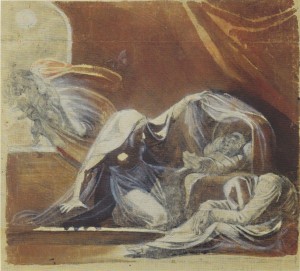In “A Midsummer Night’s Dream,” Fairy King Oberon and Queen Titania are at odds with each other because of some individual referred to as a “changeling.” Puck, Oberon’s main attendant, describes the source of the strife: “For Oberon is passing fell and wrath, Because that she as her attendant hath a lovely boy, stolen from an Indian king; She never had so sweet a changeling:” (Ii.i.20-24). OED describes this individual as a child secretly substituted for another in infancy by fairies in the night. Jealous of her attention on the boy, Oberon seeks the boy for himself, wanting the changeling to be in his service. Titania refuses Oberon’s demands, crowning the boy “with flowers” and making “him all her joy,” adopting him as her own child. Oberon, as a way to spite his wife, uses a magical flower to put her under Cupid’s spell. While Titania falls in love with a man with a donkey head, Oberon searches the forest for her changeling. Once he discovers the child offstage, Oberon instructs Puck to dispel the magic placed on his wife, content that he has proven his point about Titania’s foolish desires.
What is peculiar is that while the changeling causes the strife between the supernatural rulers of the forest, the individual never appears in the play itself. Indeed, the boy is only mentioned in passing by fairies, simply as an object of desire. Titania claims that the changeling’s “mother was a votaress of” her order, and that after his mother died, TItania raised him as her squire. The discrepancy between the two fairies’ stories, as well as the changeling’s actual absence from the play, suggests that the child’s mythical origin could have stemmed from multiple sources among European traditional folklore.
Many European cultures have legends about changelings and their interactions with the fairy folk. Two intertwining definitions of changelings are used through these stories. Changelings are either the abducted children that fairy folk steal from families during the night, like in MSND, or even worse, the creatures that these devious beings leave behind. These are deformed or imbecile offspring of fairies or elves. The abducted human children are given to the devil or used to strengthen/diversify fairy pedigree. One folktale suggests that fairies saw humans as a sturdier and healthier race, and wanted to save their race by breeding with humans. A changeling’s existence is believed to stem from the archaic idea that infants were susceptible to demonic possession. Changelings were the common excuse for infants that were deformed or sickly as children, expected to die early in childhood. In some cultures, the return of the “original” child might occur by making the changeling laugh or even torturing it. The later belief was believed to be the explanation for many cases of actual child abuse.
In Northern England, elves/fairies were believed to live in the hills along the border of Scotland. Connected to this belief was the concept of these supernatural beings “spiriting away” children to their own world. While the real baby or child was treated by the elves as royalty in their kingdom, the replacement “child,” usually a male elf, would eventually sneak back home. In order to ward off mischievous fairy-folk, people would place herbs, salves, seeds and other symbols near the infant’s crib.
In Ireland, another possible source of supernatural influence for Shakespeare, fairies were commonly accused of stealing children away to live in the fairy realm. The humans who were most at risk were midwives and new mothers. Because of their fertility and the critical point of their lives, midwives and new mothers were whisked away to become servants of the fairy queens and tend to fairy children. This idea reflects Titania’s explanation of how the changeling in the story came into her possession. Spirited away during her youth and growing up as a votaress of Titania’s order, the changeling mother followed Titania’s commands, eventually becoming pregnant herself. In the “spiced Indian air, by night, Full often hath she gossip’d by [Titania’s] side, And sat with [her] on Neptune’s yellow sands” (II.I.124-126). Passing away during childbirth, the votaress’ son is left in Titania’s hands. Irish folklore continues to explain that fairy women find childbirth difficult and that fairy children that survive are often deformed and stunted in growth. This in turn encouraged them to steal healthy children away from their cribs and replace them with their sickly surrogates.
While referring to Classical mythology when describing his human characters in MSND, Shakespeare uses medieval folklore when describing his supernatural creatures, using fairies and changelings from Irish and British legends. The changeling’s ownership, briefly mentioned in MSND, initiates the supernatural plot that causes the mischief and mayhem in the mortal realm.


